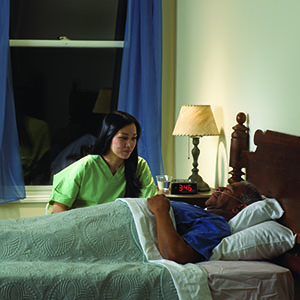Five Quick Points About Congestive Heart Failure
 Your eye flutters open. It's early in the morning, and you're awake, but you feel weak and don't want to leave the bed. You're thirsty, but getting up and pouring a glass of water takes some mental preparation. You know that if you do it, you'll be winded and tired by the time you get to the kitchen. Your whole body feels like a rock -- heavy, dense and hard to move.
Your eye flutters open. It's early in the morning, and you're awake, but you feel weak and don't want to leave the bed. You're thirsty, but getting up and pouring a glass of water takes some mental preparation. You know that if you do it, you'll be winded and tired by the time you get to the kitchen. Your whole body feels like a rock -- heavy, dense and hard to move.
This is what it feels like to be one of the five million Americans currently living with congestive heart failure (CHF). February is Heart Month, and CHF is a cumbersome disease. For a more in depth look at the condition and tips for living with it, head this way. For a quick update and simple understanding of what you could be dealing with as a patient or a caregiver, here are five quick points about CHF:
1 - What CHF Feels Like
To put it simply, CHF is when blood backs up into any organs of the body because the heart muscle isn’t able to pump as well as it had when it was healthy.
“All of that just kind of pools and backs up or, what they call, ‘congest,’” explains Dyanna Johnston, a Nurse Practitioner with Crossroads Hospice based in Oklahoma City. “That’s where they get the term congestive heart failure.”
“About 99 percent of [patients] usually complain of shortness of breath, as you can imagine, with all that blood pooling,” Johnston says. “You’re going to have difficulty breathing, especially if the blood is pooling in the lungs.”
Along with the common symptom of shortness of breath, what Johnston often sees among patients are fatigue, swelling dependent on where the blood is pooling and significant weight gain as a result of fluid retention and accumulation that’s not able to process out of the body.
All of this can make it not only difficult to exercise, but even perform simple tasks such as showering or walking from one end of a room to another, depending on the severity of the condition.
“It’s really difficult to deal with,” Johnston says.
2 - Prevention of CHF
Often times, CHF strikes as a result of bad health choices over a long period of time such as smoking, poor diet and other lifestyle choices that are potentially damaging to the heart. Heart failure occurs because your heart can’t pump properly.
“If your heart isn’t healthy, then this can lead to congestive heart failure,” Johnston says.
Johnston’s recommendations for preventing CHF include a better diet, more exercise, not smoking and generally avoiding lifestyle choices that can damage your heart such as practicing poor dental hygiene and isolating yourself on a regular basis.
3 - The Power of Healthy Choices
Even when patients do find themselves diagnosed with CHF, the same types of lifestyle modifications can help to relieve a lot of the symptoms of the condition.
“You’d be surprised at how many people I’ve helped or taken care of who have congestive heart failure that are still smokers,” Johnston says.
In those cases, quitting smoking would be at the top of the list of things to do in order to improve that patient’s condition. In addition, making attempts to lose or maintain weight, eating a healthy diet and making sure you get your necessary vaccines and flu shots can all potentially play larger roles in improving your condition or ensuring it doesn’t become drastically worse.
4 - Caregiving Tips
A major key for a caregiver in nearly any situation is patience.
“[The caregiver should] really kind of put themselves in [the patient’s] shoes and realize that something we might think is simple, they’re not able to do,” Johnston recommends. “Remember not to get frustrated.”
CHF patients very well may not be able to wash themselves or walk to the other end of the room for a drink of water. Caregivers should be patient and realize these patients are winded, weak and fatigued.
Beyond that, as a caregiver is aware of the lifestyle modifications the patient can make to improve their condition, they can act as a support system and even the voice of reason in urging the patients to do so.
If you’re the caregiver, don’t buy a CHF patient a pack of cigarettes or unhealthy foods. Don’t help contribute to the problem.
5 - Trust the Experts
With CHF being such a widespread condition across our country and the world, Crossroads is fortunate to have incredible nurses and nurse practitioners that are able to go in every day and take care of those patients that are terminally ill, whether it be in helping with medications or keeping them comfortable. Take it from Johnston, who sees it firsthand on a regular basis:
“We know the signs to look for and how to help keep [patients] comfortable. We have a great team to help in that area, and for giving caregivers support, too.”
If you’re a caregiver with a loved one with CHF, call Crossroads Hospice to see if we can help – 888-564-3405.
